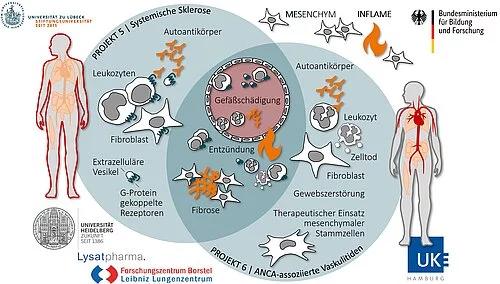Better understanding and more targeted treatment of chronic musculoskeletal disorders
In the research consortium MESINFLAME researchers involving the Cluster of Excellence "Precision Medicine in Chronic Inflammation" (PMI) are planning to investigate the role of the connective tissue in inflammatory musculoskeletal disorders.
Back pain, arthrosis and rheumatic diseases are a few of the more than 200 forms of illness that are defined as inflammatory musculoskeletal disorders, IMDs. These are chronic inflammatory disorders that affect the musculoskeletal system and in particular, muscles, bones and joints. Many patients suffer from severe pain and physical limitations that can significantly restrict their lives. They depend on intensive medical care, which puts a strain on both patients and their families. These common forms of illness also put a considerable strain on the healthcare system because of their high treatment costs. There is as yet insufficient knowledge of the cause of musculoskeletal disorders. With the assistance of the Cluster of Excellence “Precision Medicine in Chronic Inflammation” (PMI), this is something researchers want to change in the newly established research consortium MESINFLAME, which is funded by the Federal Ministry of Education and Research (BMBF).
The aim of the interdisciplinary project, which is coordinated by Professor Thomas Pap of the University of Münster, is to research the role of connective tissue, what is known as mesenchyme, in the emergence and chronification of IMDs. The researchers plan to develop innovative diagnosis and treatment methods based on their findings. The Federal Ministry of Education and Research (BMBF) is providing the interdisciplinary research consortium MESINFLAME (full title: “Integrative preclinical strategies for targeting the local mesenchyme as a regulator of tissue specifity in inflammatory musculoskeletal disorders (IMDs)”) with funding of around €4 million over three years. Two sub-projects will be carried out at the Department of Rheumatology and Immunology at the University Medical Center Schleswig-Holstein (UKSH), Campus Lübeck.
“Much of what we already know about IMDs, in other words, about what goes wrong with the immune system as a result of these disorders, either applies to all of these disorders or at least there is some overlapping between them. By contrast, the individual forms of disease are very organ-specific. But why, for example, one disorder affects the knee and another affects the back is something we do not yet understand well enough,” explained Professor Gabriela Riemekasten, member of the MESINFLAME Steering Committee, Director of the Department of Rheumatology and Immunology at UKSH, Campus Lübeck, and member of the Executive Group of the Cluster of Excellence PMI. “Recent findings suggest that the local connective tissue plays an important role in organ specifity. One hypothesis in the case of IMDs is that local factors within the connective tissue, such as e.g. extracellular vesicles and tissue-specific antibodies regulate the form in which and the severity with which the particular musculoskeletal disorder develops. This could be an approach for new, more specific and lasting treatments,” said Prof. Riemekasten.
In the projects being carried out within the framework of MESINFLAME in Lübeck, two rheumatic autoimmune diseases belonging to the IMD group are being investigated using patient trials as well as various in vitro and in vivo models in order to develop new, effective treatment methods. These two diseases are the connective tissue disease “systemic sclerosis” and the vascular disease “granulomatosis with polyangiitis”, which form key areas of expertise at the Department of Rheumatology and Immunology at the UKSH, Campus Lübeck.
One of the two Lübeck projects is led by Prof. Riemekasten, Director of the Department and member of the Executive Group of the Cluster of Excellence PMI. Here she is examining the role of extracellular vesicles, which are bubble-like structures outside the cells and autoantibodies, which are antibodies that attack the body's own structures. She suspects that in these autoantibodies and extracellular vesicles there is a mediator function for tissue and organ damage in autoimmune diseases.
The second project in Lübeck is led by Professor Peter Lamprecht, who is also from the Department of Rheumatology and Immunology at the UKSH, Campus Lübeck, and member of the Cluster of Excellence PMI. The aim of his project is to research the potential of connective tissue stem cells as a treatment option for the rheumatic autoimmune disease granulomatosis with polyangiitis (GPA), which is an inflammatory disease of the blood vessels.
“Connective tissue stem cells have great potential for breaking the cycle of chronic inflammation. This is indicated by previous work on other diseases,” said Prof. Lamprecht. “Using six model diseases, including the blood vessel inflammation GPA, our aim in the project MESINFLAME is to work together to find treatment options for musculoskeletal disorders based on connective tissue stem cells. We hope the findings from the model diseases can later be transferred to further musculoskeletal disorders,” added Prof. Lamprecht.
The MESINFLAME-projects in Lübeck:
Project 5 - Autoantibodies and extracellular vesicles as driver for organ-specific tissue damage in connective tissue diseases
- Principle Investigators:
- Prof. Gabriela Riemekasten (PI, Member of the Steering Committee), Department of Rheumatology and Immunology, UKSH, Campus Lübeck
- Prof. Tanja Lange (Co-PI), Department of Rheumatology and Immunology at the UKSH, Campus Lübeck
- Prof. Xinhua Yu (Co-PI), Head of the Research Group “Immune Lung Diseases”, Research Center Borstel - Leibniz Lung Center
Projekt 6 - Mesenchymal stem cells as a treatment strategy for ANCA- associated vasculitis
- Principle Investigators:
- Prof. Peter Lamprecht (PI), Department of Rheumatology and Immunology, UKSH, Campus Lübeck
- Prof. Udo Schumacher (Co-PI), Institute of Anatomy and Experimental Morphology, University Medical Center Hamburg-Eppendorf
Scientific Contakt:
Prof. Gabriela Riemekasten
Department of Rheumatology and Immunology, UKSH, Campus Lübeck
+49 451 500 45200
gabriela.riemekasten@uksh.de
Lübeck projects in the BMBF consortium MESINFLAME: Project 5 - Autoantibodies and extracellular vesicles as driver for organ-specific tissue damage in connective tissue diseases; Project 6 - Mesenchymal stem cells as a treatment strategy for ANCA- associated vasculitis.
Member of the MESINFLAME Steering Committee and Principle Investigator on Project 5: Professor Gabriela Riemekasten, Director of the Department of Rheumatology and Immunology at the UKSH, Campus Lübeck and Executive Group member of the Cluster of Excellence "Precision Medicine in Chronic Inflammation” (PMI).
Project website
About the Cluster of Excellence PMI
The Cluster of Excellence "Precision Medicine in Chronic Inflammation" (PMI) is being funded from 2019 to 2025 through the German Excellence Strategy (ExStra). It succeeds the "Inflammation at Interfaces” Cluster, which was already funded in two periods of the Excellence Initiative (2007-2018). Around 300 members from eight institutions at four locations are involved: Kiel (Kiel University, University Medical Center Schleswig-Holstein (UKSH), Muthesius University of Fine Arts and Design, Kiel Institute for the World Economy (IfW), Leibniz Institute for Science and Mathematics Education (IPN)), Lübeck (University of Lübeck, University Medical Center Schleswig-Holstein (UKSH)), Plön (Max Planck Institute for Evolutionary Biology) and Borstel (Research Center Borstel - Leibniz Lung Center).
The goal is to translate interdisciplinary research findings on chronic inflammatory diseases of barrier organs to healthcare more intensively, as well as to fulfil previously unsatisfied needs of the patients. Three points are important in the context of successful treatment, and are therefore at the heart of PMI research: the early detection of chronic inflammatory diseases, the prediction of disease progression and complications, and the prediction of individual responses to treatment.
Press office
fbuhse@uv.uni-kiel.de+49 (0)431/880 4682 https://precisionmedicine.de
Cluster of Excellence "Precision Medicine in Chronic Inflammation"
Scientific Office
Head: Dr. habil. Susanne Holstein Postal
Christian-Albrechts-Platz 4, 24118 Kiel, Germany
Contact: Sonja Petermann
+49 (0)431 880-4850, fax: +49 (0)431 880-4894
spetermann@uv.uni-kiel.de
Twitter: PMI @medinflame






